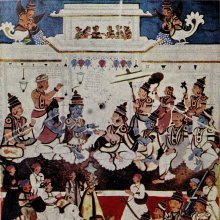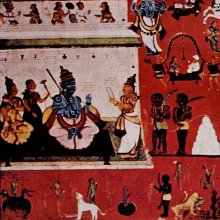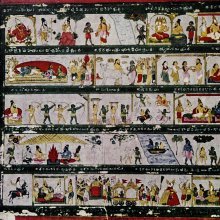Yudhishthira, Yudhiṣṭhira, Yudhisthira: 23 definitions
Introduction:
Yudhishthira means something in Hinduism, Sanskrit, the history of ancient India. If you want to know the exact meaning, history, etymology or English translation of this term then check out the descriptions on this page. Add your comment or reference to a book if you want to contribute to this summary article.
The Sanskrit term Yudhiṣṭhira can be transliterated into English as Yudhisthira or Yudhishthira, using the IAST transliteration scheme (?).
Images (photo gallery)
In Hinduism
Vaishnavism (Vaishava dharma)
Source: ISKCON Press: GlossaryYudhiṣṭhira (युधिष्ठिर).—The eldest of the Pāṇḍavas in the Mahābhārata, and the son of Dharmarāja or Yamarāja, the god of death. It was the dispute over his succession to the throne in India that led to the Battle of Kurukṣetra; he ruled the earth after the Kurukṣetra war.
Source: Pure Bhakti: Brhad BhagavatamrtamYudhiṣṭhira (युधिष्ठिर) refers to:—The personification of dharma, he is the eldest of the five Pāṇḍavas. After winning the Battle of Kurukṣetra, he became the emperor of the world. He, Śrī Uddhava, and Gīrīrāja Govardhana are known as hari-dāsa, or dear devotees of Śrī Kṛṣṇa. (cf. Glossary page from Śrī Bṛhad-bhāgavatāmṛta).

Vaishnava (वैष्णव, vaiṣṇava) or vaishnavism (vaiṣṇavism) represents a tradition of Hinduism worshipping Vishnu as the supreme Lord. Similar to the Shaktism and Shaivism traditions, Vaishnavism also developed as an individual movement, famous for its exposition of the dashavatara (‘ten avatars of Vishnu’).
Purana and Itihasa (epic history)
Source: Wisdom Library: Bhagavata PuranaYudhiṣṭhira (युधिष्ठिर):—One of the sons of Pāṇḍu, begotten by Dharmarāja (god of wind) through the womb his wife Kuntī. He had a son by his wife Draupadī named Prativindhya. He also begot a son named Devaka through the womb of another wife called Pauravī. (see Bhāgavata Purāṇa 9.22.27-28)
Source: archive.org: Puranic EncyclopediaYudhiṣṭhira (युधिष्ठिर).—See under Dharmaputra.
Source: Cologne Digital Sanskrit Dictionaries: The Purana IndexYudhiṣṭhira (युधिष्ठिर).—A son of Kuntī and Pāṇḍu born of Dharma, and father of Prativindhya and Sudhanu. Devaka was another son by Pauravī; descendants of Ajamīḍha;1 was defeated in a game of dice and was banished to the forest with his brothers and their wife. Was met and consoled by Kṛṣṇa and Satyabhāmā. Kṛṣṇa's respects to: heard from Nārada that Kṛṣṇa was the Supreme Hari and was much pleased. Enquired of Him when he met him at the city of the Pāñcālas. He and his four brothers were met by Kṛtavarman.2 His desire to perform the Rājasūya; joy at Kṛṣṇa's visit: provided suitable lodgings for Kṛṣṇa and his family. Addressing of the assembly on his desire to perform the Rājasūya, Kṛṣṇa asked him to get ready by defeating all the kings and bringing thus all the earth under his control: sent out his brothers in the four directions who defeated kings and brought much wealth. Was glad of Jarāsandha's death at the hands of his brothers: Sent for Purohitas for the sacrifice and invited all his kith and kin. The yajña comparable to that of Varuṇa; attended by all gods. For doing honour to the sadasyas there was some doubt about the first place, and Sahadeva's suggestion of Kṛṣṇa's name was accepted by all except Śiśupāla who insulted him in the public assembly. Kṛṣṇa's silence. The Pāṇḍavas with the Matsyas and others unsheathed their swords, and Kṛṣṇa sent his cakra which cut off his head. After avabhṛta, Yudhiṣṭhira shone like Indra. All took leave of him in joy except Duryodhana, who became jealous of the success of the Rājasūya and of Draupadī, and of Kṛṣṇa. Heard of Duryodhana's fall in the sabhā and sent Kṛṣṇa with dress and ornaments to him, which he rejected.3
- 1) Bhāgavata-purāṇa IX. 22. 27-30; I. 15. 13; Brahmāṇḍa-purāṇa III. 71. 154 and 259; Matsya-purāṇa 46. 9; 50. 49; 103. 2; 189. 1; Vāyu-purāṇa 96. 153; 99. 244; 112. 44; Viṣṇu-purāṇa IV. 14. 35.
- 2) Bhāgavata-purāṇa X. 64. 4-10; 58. 4 and 11; VII. 15. 79; X. 52. [56 (v) 5-8]; 57. 10[4].
- 3) Ib. X. 70. 41; 71. 23-6 and 44; 72. 1-14; 73. 35; Chh. 74 and 75 (whole); 76. 2[3]; 77. 7.
Yudhiṣṭhira (युधिष्ठिर) is a name mentioned in the Mahābhārata (cf. I.90.69) and represents one of the many proper names used for people and places. Note: The Mahābhārata (mentioning Yudhiṣṭhira) is a Sanskrit epic poem consisting of 100,000 ślokas (metrical verses) and is over 2000 years old.

The Purana (पुराण, purāṇas) refers to Sanskrit literature preserving ancient India’s vast cultural history, including historical legends, religious ceremonies, various arts and sciences. The eighteen mahapuranas total over 400,000 shlokas (metrical couplets) and date to at least several centuries BCE.
Kavyashastra (science of poetry)
Source: Shodhganga: Bhismacaritam a critical studyYudhiṣṭhira (युधिष्ठिर) figures as a male character in the Bhīṣmacarita (Bhishma Charitra) which is a mahākāvya (‘epic poem’) written by Hari Narayan Dikshit.—Like Bhīṣma, our poet has very aptly portrayed the character of Yudhiṣṭhira as a very high soul. He was born of Dharmarāja. He was an embodiment of Dharma. [...] Yudhiṣṭhira was possessed of a number of divine qualities such as forbearance, steadfastness, endurance, humility, compassion and an unshakable love etc. Even in his childhood he had gained great popularity through his modesty, good conduct and thoughtful nature. When he was quite young his father Pāṇḍu, a great soul, left for his celestial abode. Since then he would regard his senior uncle Dhṛtarāṣṭra as his father and developed a great respect for him and never disobeyed him.
Yudhiṣṭhira was tolerant and very cautious about the discharge of his duties. He could bear to suffer any loss but the lapse in Dharma was unbearable to him. A better example of one’s love for Dharma and tolerance can hardly be found in the world except Yudhiṣṭhira. Further, he was very intelligent as he was very skilled in shaping his behaviour appropriate to the occasion. He was always conscious in offering due respect to elderly people. He did not fail to observe social decorum even in the most strained circumstances. His intellect can be observed in his making calculation of not winning against Bhīṣma in the great Mahābhārata war.
Yudhiṣṭhira was very compassionate. He was getting pained in the heart on seeing others unhappy. Still extraordinary was his affection and love for those taking refuge in him. He was greatly shocked to hear about the departure of Lord Śrī Kṛṣṇa to His supreme abode and the extermination of the Yādavas. Similarly, he got very sad at the time of Bhīṣma’s last journey i.e. departure to the final beatitude. It shows how lovable and affectionate he was. Even though he was full of all good qualities, he had one bad habit. He was fond of the game of dice, in which he lost everything. Thus, he is portrayed as a person of modesty, good conduct and thoughtful nature.

Kavyashastra (काव्यशास्त्र, kāvyaśāstra) refers to the ancient Indian tradition of poetry (kavya). Canonical literature (shastra) of the includes encyclopedic manuals dealing with prosody, rhetoric and various other guidelines serving to teach the poet how to compose literature.
Jyotisha (astronomy and astrology)
Source: Wisdom Library: Brihat Samhita by VarahamihiraYudhisthira (युधिस्थिर) (also known as Dharmaputra) is the eldest of the Pāṇḍus who flourished at the end of the Dvāparayuga, according to the Bṛhatsaṃhitā (chapter 13), an encyclopedic Sanskrit work written by Varāhamihira mainly focusing on the science of ancient Indian astronomy astronomy (Jyotiṣa).—Accordingly, “During the reign of Yudhisthira, 2526 years before the commencement of Vikrama Śaka, the Seven Ṛṣis (saptarṣi) were at the constellation of Maghā (Regulus). The Ṛṣis take a period of 100 years to go over each of the 27 asterisms. They rise in the north-east and are accompanied by the chaste Arundhatī—the consort of Vasiṣṭha. The eastern-most of the group is Bhagavān Marīci; the next to him is Vasiṣṭha; the next is Aṅgiras and the next two are—Atri and Pulastya. The next in order are the Ṛṣis—Pulaha and Kratu. The chaste Arundhatī closely attends her husband the sage Vasiṣṭha”.

Jyotisha (ज्योतिष, jyotiṣa or jyotish) refers to ‘astronomy’ or “Vedic astrology” and represents the fifth of the six Vedangas (additional sciences to be studied along with the Vedas). Jyotisha concerns itself with the study and prediction of the movements of celestial bodies, in order to calculate the auspicious time for rituals and ceremonies.
General definition (in Hinduism)
Source: Wisdom Library: HinduismYudhishthira is the eldest son of King Pandu and leader of the Pandavas in the Kurukshetra War. Duryodhana (son of Dhritarashtra) disputed his claim to the throne. He also challenged Yudhisthira in a game of (rigged) dice winning every game hence his kingdom and wealth. Also see: Duryodhana
Source: WikiPedia: HinduismYudhisthira is the eldest son of King Pandu and Queen Kunti. He was king of Indraprastha and later of Hastinapura. He was the leader of the Pandava side in the Kurukshetra War. For his piety, he was known as Dharmaraja (which may be translated as either ‘righteous king’ or ‘king of dharma’).
Yudhisthira; (Sanskrit: युधिष्ठिर, yudhiṣṭhira meaning “steady in war”, from yuddha meaning war, and sṭhira meaning steady).
Source: JatLand: South AsiaYudhisthira (युधिष्ठिर) (yudhiṣṭhira) was the eldest son of King Pandu and Queen Kunti, king of Hastinapura and Indraprastha, and World Emperor. He was the principal protagonist of the Kurukshetra War, and for his unblemished piety, known as Dharmaraja (Most pious one). Some sources describe him to be an adept warrior with the Spear. He is also known as Bharata (Descendant of the line of Bharata) and Ajatashatru (One Without Enemies). Yudhisthira’s four younger brothers were Bhima, (born by invoking Vayu); Arjuna, (born by invoking Indra); and the twins Nakula and Sahadeva, (born by invoking the Ashwini Gods).
India history and geography
Source: archive.org: Personal and geographical names in the Gupta inscriptionsYudhiṣṭhira (युधिष्ठिर) is an example of a name based on an Epic or Purana mentioned in the Gupta inscriptions. The Gupta empire (r. 3rd-century CE), founded by Śrī Gupta, covered much of ancient India and embraced the Dharmic religions such as Hinduism, Buddhism and Jainism. Derivation of personal names (e.g., Yudhiṣṭhira) during the rule of the Guptas followed patterns such as tribes, places, rivers and mountains.

The history of India traces the identification of countries, villages, towns and other regions of India, as well as mythology, zoology, royal dynasties, rulers, tribes, local festivities and traditions and regional languages. Ancient India enjoyed religious freedom and encourages the path of Dharma, a concept common to Buddhism, Hinduism, and Jainism.
Languages of India and abroad
Sanskrit dictionary
Source: DDSA: The practical Sanskrit-English dictionaryYudhiṣṭhira (युधिष्ठिर).—'Firm in battle', Name of the eldest Pāṇḍava prince, also called 'Dharma', 'Dharmarāja', 'Ajātaśatru' &c. [He was begotten on Kuntī by the god Yama. He is known more for his truthfulness and righteousness than for any military achievements or feats of arms. He was formally crowned emperor of Hastināpura at the conclusion of the great Bhāratī war after eighteen days' severe fighting, and reigned righteously for many years. For further particulars about his life, see दुर्योधन (duryodhana).]
Derivable forms: yudhiṣṭhiraḥ (युधिष्ठिरः).
Source: Cologne Digital Sanskrit Dictionaries: Edgerton Buddhist Hybrid Sanskrit DictionaryYudhiṣṭhira (युधिष्ठिर).—[, see Āyudhiṣṭhira.]
Source: Cologne Digital Sanskrit Dictionaries: Shabda-Sagara Sanskrit-English DictionaryYudhiṣṭhira (युधिष्ठिर).—m.
(-raḥ) The elder of the five Pandava princes, and leader in the great war, between them and the Kurus, in the beginning of the fourth age; the nominal son of Pandu whom he succeeded in the sovereignty of India, but according to the legend, begotten on Kunti by the deity Yama. E. yudhi in war or battle, and ṣṭhira for sthira firm; it is also sometimes read yuddhasthira .
Source: Cologne Digital Sanskrit Dictionaries: Benfey Sanskrit-English DictionaryYudhiṣṭhira (युधिष्ठिर).—i. e. yudh + i -sthira, m. The elder of the five Pāṇ- ḍavas, [Pañcatantra] ii. [distich] 4.
Source: Cologne Digital Sanskrit Dictionaries: Cappeller Sanskrit-English DictionaryYudhiṣṭhira (युधिष्ठिर).—[masculine] [Name] of the eldest son of Paṇḍu etc. (lit. firm in battle).
Source: Cologne Digital Sanskrit Dictionaries: Monier-Williams Sanskrit-English Dictionary1) Yudhiṣṭhira (युधिष्ठिर):—[=yudhi-ṣṭhira] [from yudhi > yudh] m. (for -sthira) ‘firm or steady in battle’, Name of the eldest of the 5 reputed sons of Pāṇḍu (really the child of Pṛthā or Kuntī, Pāṇḍu’s wife, by the god Dharma or Yama, whence he is often called Dharma-putra or Dharma-rāja; he ultimately succeeded Pāṇḍu as king, first reigning over Indra-prastha, and afterwards, when the Kuru princes were defeated, at Hastinā-pura; cf. [Indian Wisdom, by Sir M. Monier-Williams 379 etc.]), [Mahābhārata; Harivaṃśa; Purāṇa]
2) [v.s. ...] of a son of Kṛṣṇa, [Harivaṃśa]
3) [v.s. ...] of two kings of Kaśmīra, [Rājataraṅgiṇī]
4) [v.s. ...] of a potter, [Pañcatantra]
5) [v.s. ...] (with mahopādhyāya) of a preceptor, [Catalogue(s)]
6) [v.s. ...] [plural] the descendants of Yudhi-ṣṭhira (son of Pāṇḍu), [Pāṇini 2-4, 66 [Scholiast or Commentator]]
Source: Cologne Digital Sanskrit Dictionaries: Yates Sanskrit-English DictionaryYudhiṣṭhira (युधिष्ठिर):—(raḥ) 1. m. The elder of the five Pāndava princes.
Source: DDSA: Paia-sadda-mahannavo; a comprehensive Prakrit Hindi dictionary (S)Yudhiṣṭhira (युधिष्ठिर) in the Sanskrit language is related to the Prakrit word: Jahiṭṭhila.
[Sanskrit to German]
Sanskrit, also spelled संस्कृतम् (saṃskṛtam), is an ancient language of India commonly seen as the grandmother of the Indo-European language family (even English!). Closely allied with Prakrit and Pali, Sanskrit is more exhaustive in both grammar and terms and has the most extensive collection of literature in the world, greatly surpassing its sister-languages Greek and Latin.
Kannada-English dictionary
Source: Alar: Kannada-English corpusYudhiṣṭhira (ಯುಧಿಷ್ಠಿರ):—
1) [noun] a soldier who fights boldly and with determination.
2) [noun] the eldest of the five Paṇḍava brothers and one of the main characters in the great Indian epic Mahābhārata.
Kannada is a Dravidian language (as opposed to the Indo-European language family) mainly spoken in the southwestern region of India.
See also (Relevant definitions)
Partial matches: Yudhi, Sthira, Yuti.
Starts with: Yudhishthira mahopadhyaya, Yudhishthiradigvijaya, Yudhishthiravijaya.
Ends with: Ayudhishthira, Sayudhishthira.
Full-text (+394): Dharmaputra, Dharmarajan, Pandava, Dharmaraja, Yaudhishthira, Anantavijaya, Punyashloka, Rajalakshman, Shalyari, Ajatasatru, Karnanuja, Yaudheya, Prithasunu, Prithajanman, Kururaja, Dharmaja, Prithabhu, Pauravi, Dharmajanman, Jayaskandha.
Relevant text
Search found 98 books and stories containing Yudhishthira, Yudhiṣṭhira, Yudhisthira, Yudhi-shthira, Yudhi-ṣṭhira, Yudhi-sthira; (plurals include: Yudhishthiras, Yudhiṣṭhiras, Yudhisthiras, shthiras, ṣṭhiras, sthiras). You can also click to the full overview containing English textual excerpts. Below are direct links for the most relevant articles:
List of Mahabharata tribes (by Laxman Burdak)
Shrimad Bhagavad-gita (by Narayana Gosvami)
Verse 1.16 < [Chapter 1 - Sainya-Darśana (Observing the Armies)]
Verses 1.4-6 < [Chapter 1 - Sainya-Darśana (Observing the Armies)]
Garga Samhita (English) (by Danavir Goswami)
Verse 1.5.27 < [Chapter 5 - The Lord’s Appearance]
Brihad Bhagavatamrita (commentary) (by Śrī Śrīmad Bhaktivedānta Nārāyana Gosvāmī Mahārāja)
Verse 1.7.58 < [Chapter 7 - Pūrṇa (pinnacle of excellent devotees)]
Verse 1.5.4-5 < [Chapter 5 - Priya (the beloved devotees)]
Verse 1.4.117-118 < [Chapter 4 - Bhakta (the devotee)]
Mahabharata (English) (by Kisari Mohan Ganguli)
Section XXXII < [Rajasuyika Parva]
Section XII < [Dronabhisheka Parva]
Section XXXV < [Rajasuyika Parva]
The Bhagavata Purana (by G. V. Tagare)
Chapter 71 - Śrī Kṛṣṇa’s visit to Indraprastha < [Book 10 - Tenth Skandha]
Chapter 75 - Discomfiture of Duryodhana < [Book 10 - Tenth Skandha]
Chapter 74 - Yudhiṣṭhira’s Rājasūya: Śiśupāla slain < [Book 10 - Tenth Skandha]
Related products




